Missing Her is a moving, elegant series of poems, or elegies, that examines loss on both a very public and a private level. Keelan’s topics include Mary after the birth of Jesus, the Vietnam War, September 11th, Hurricane Katrina, and the death of her father. In “About Suffering They Were,” she writes, “There are no old poems, / Only new textbooks directing / The unprepared student to the painting / Behind the poem.” In Missing Her, we are all unprepared students, and Keelan leads us not merely to her poems but to the truths behind poetry. Continue reading “Missing Her”
NewPages Blog
At the NewPages Blog readers and writers can catch up with their favorite literary and alternative magazines, independent and university presses, creative writing programs, and writing and literary events. Find new books, new issue announcements, contest winners, and so much more!
Missing Her
Spread the word!
Torched Verse Ends
Steven Schroeder and his brain like to wander. Whether physically through the landscapes of Colorado, or mentally through recollections of schadenfreude, Schroeder drags his rucksack of modern references behind him. String theory, Asimov, army-town life, thermodynamics – all pop up naturally in the course of his bizarre musings. Continue reading “Torched Verse Ends”
Spread the word!
The Warmest Place of All
This children’s picture book follows Sophie’s search for the warmest place in her house after spending time outside playing in the snow. Ultimately, the warmest place is snuggled up next to her parents in their bed during the middle of the night. The story is light and sweet while the illustrations are delightful and fun. Altogether, a great book for bedtime. Continue reading “The Warmest Place of All”
Spread the word!
Home Free
I loved this book! I think I fell in love with it the first time the main character, Lee, mentions Anne of Green Gables and her excitement about meeting a “real-life orphan,” Cassandra, who is moving in with a relative next door. Anne was my favorite character from children’s books when I was a kid. She felt like a real person to me – a friend, someone I wanted to meet, someone I wanted to be like, someone I was – dare I say it? – jealous of – exactly the way Lee feels. But being an orphan in real life isn’t all it’s cracked up to be, as Lee finds out when she becomes friends with Cassandra. Continue reading “Home Free”
Spread the word!
Jesse Ball Debuts Novella on Guernica
Jesse Ball, noted poet, novelist, and winner of the Plimpton Prize, debuts his novella, Pieter Emily, to be presented in three parts on Guernica: A Magazine of Art and Politics.
Spread the word!
CNF Best Of Issue
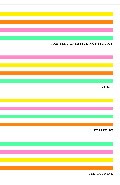 Issue #37: The Best Creative Nonfiction, Volume 3, the third annual collaboration between CNF and W.W. Norton, is now available.
Issue #37: The Best Creative Nonfiction, Volume 3, the third annual collaboration between CNF and W.W. Norton, is now available.
Spread the word!
Poe Exhibit
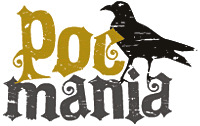 From Out That Shadow: The Life and Legacy of Edgar Allan Poe, September 8, 2009 – January 3, 2010 at the Harry Ransom Center, The University of Texas, Austin. Site includes online content.
From Out That Shadow: The Life and Legacy of Edgar Allan Poe, September 8, 2009 – January 3, 2010 at the Harry Ransom Center, The University of Texas, Austin. Site includes online content.
Spread the word!
New Lit on the Block :: Ambassador Poetry Project
Founding Editor Lori A. May introduces this new online publication: “The Ambassador Poetry Project aims to showcase poetic talent from and about Ontario and Michigan. While many of the works featured will naturally offer regional insights, inspirations, and experiences, the publication aims to encompass more than a ‘border town’ vibe. Just as the infamous bridge was created to link the two countries, The Ambassador Poetry Project aims to connect Canadian and American writers and readers who share a common fondness for poetry.”
The first issue includes cover art by C. Shier, poetry by John Jeffire, Mariela Griffor, Penn Kemp, Dana Ruzicka, ML Liebler, Laurence W. Thomas, Ken Meisel, Oliver Ho, Olga Klekner, Amy Stilgenbauer, Melinda LePere, Eric Torgersen, Heather Ann Schmidt, Randall R. Freisinger, Karen Calaiezzi, and visual works by Brita V. Brookes.
The Ambassador Poetry Project accepts submissions of poetry, poetry-related narratives, occasional regional book reviews, and artwork.
Spread the word!
How to Read a Poem
Tupelo Press offers a number of free PDF Reader’s Companions for its poetry books – some written by the authors, some including additional materials such as interviews. These are not simple guides, but more like supplemental readers! In the reader’s companion to her book, Pslams , Carol Ann Davis includes two pages on “How to Read a Poem.” This is a bonus stand-alone for teachers and readers, coursing through a serious of questions, coming to this final one: “Let the questions go until there’s only one remaining: How does it make you feel?”
Spread the word!
Jobs
The Dartmouth College Department of English seeks to hire a tenure-track assistant professor in creative nonfiction. Nov 2. English.department-at-dartmouth-dot-edu
The University of Connecticut English Department seeks a poet to serve as Assistant/Associate/Full Professor In Residence to begin fall 2010. Wayne Franklin, Head, Department of English, POET Search.
Western Michigan University invites applications for a tenure-track academic year position in English, Creative Writing (Fiction). Dr. Richard Utz, Chair, Department of English. Start date: Dec. 14,2009
The Creative Writing Program at the University of Oregon welcomes applications for a tenure-track Associate or Assistant Professor in Poetry. Karen J. Ford, Director, Creative Writing Program. Nov 15
Davidson College invites distinguished poets to apply for a one semester, non-renewable professorship, the McGee Professor of Creative Writing, for appointment either the fall of 2010 or the spring of 2011. Responsibilities: teach two poetry writing courses, offer one public reading, and advise two honors students; commitment to teaching excellence required. Qualifications: extensive high quality publications, significant awards and/or fellowships. $50,000 salary, furnished apartment. Send letter of application, c.v., a list of references, & copies of recent books to: Alan Michael Parker, Director of Creative Writing, Davidson College, Box 7010, Davidson, NC, 28035-7010.
Spread the word!
The Iowa Review Design Contest
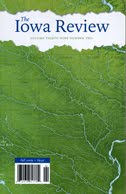 The Iowa Review will enter its 40th year of publication in 2010. To mark this milestone, they are holding a competition to redesign their cover. The new look will be implemented beginning with the April 2010 issue. The winning entry will receive $1,000, as well as acknowledgement in every issue in which the designer’s work is used. The new print design will be coordinated with the redesign of The Iowa Review’s website, which also will launch in April 2010. Full contest details here. Deadline: October 19
The Iowa Review will enter its 40th year of publication in 2010. To mark this milestone, they are holding a competition to redesign their cover. The new look will be implemented beginning with the April 2010 issue. The winning entry will receive $1,000, as well as acknowledgement in every issue in which the designer’s work is used. The new print design will be coordinated with the redesign of The Iowa Review’s website, which also will launch in April 2010. Full contest details here. Deadline: October 19
Spread the word!
New Lit on the Block :: Wild Orchids
Wild Orchids is an annual journal “in which poets, theorists, and visual artists are invited to respond to the work of another in affective and other formally unexpected ways.” Each issue is centered on a single author with the first focussing on Herman Melville and including contributions from Kim Evans, Benjamin Friedlander, Alan Halsey, Donald Pease, Courtney Pfahl, Joyelle McSweeney, Jennifer Scappettone, Geraldine Monk, Chris Sylvester, Stacy Szymaszek, and Mark von Schlegell.
Wild Orchids is currently reading submissions for their second issue, which will take shape around the life and writing of NYC poet Hannah Weiner.nnual edition .
Wild Orchids is edited by Sean Reynolds and Robert Dewhurst, graduate students in the Poetics Program at the State University of New York at Buffalo.
Spread the word!
David Biespiel Answers the Question
David Biespiel leaves Poetry Northwest after five years as Editor. His farewell commentary in issue eight is titled: “A Sense of Form and a Sense of Life: Here’s hoping it’s not too late to finally answer the question, ‘What is it you’re looking for in a poem?'” It’s worth a read by us all – editors, writers and readers.
Spread the word!
NU Sends Mixed Message
Northwestern University has “reaffirmed its commitment to publishing and disseminating scholarly writing” in a nationwide search for a new director of the Press. This same commitment takes a different approach in the announcement that TriQuarterly Magazine “will be going online within the year.” Other communications besides the university’s PR machine would suggest that the funding for the print pubication has been cut and the shift to online is the only means of TriQuarterly‘s survival. A bit of a mixed message from NU.
Spread the word!
New Editors at Versal
Versal, the internationally acclaimed literary annual published in Amsterdam, announces the start of its eighth reading period and welcomes four new editors to its team:
“Jennifer K. Dick, the author of Fluorescence (Univ. of Georgia Press, 2004) and Enclosures (Blazevox, 2007), joins the poetry team, along with Matthew Sadler, whose first chapbook is to be published with Flying Guillotine Press in Brooklyn. BJ Hollars is the newest member of the fiction team. He edited the recently released anthology You Must Be This Tall To Ride: Contemporary Writers Take You Inside The Story from Writer’s Digest Books. Finally, Shayna Schapp is Versal’s new assistant art editor. She teaches at the Royal Academy of Art in The Hague.”
Versal is currently accepting submissions of poetry, prose, and art for the eighth issue due out in May 2010.
Spread the word!
New Lit on the Block :: New CollAge
 Founded in 1970 at New College of Florida, New CollAge is a journal of new writing and visual art produced by a general editor alongside a staff of New College of Florida undergraduates who subscribe to the notion that a collage is an assemblage of different voices that merge to create new conversations. New CollAge is published annually with web exclusives throughout the year. The staff for this first issue (Spring 2009) of the “re-launching includes Founding Editor A. McA. Miller, Editor Alexis Orgera, and a full editorial staff.
Founded in 1970 at New College of Florida, New CollAge is a journal of new writing and visual art produced by a general editor alongside a staff of New College of Florida undergraduates who subscribe to the notion that a collage is an assemblage of different voices that merge to create new conversations. New CollAge is published annually with web exclusives throughout the year. The staff for this first issue (Spring 2009) of the “re-launching includes Founding Editor A. McA. Miller, Editor Alexis Orgera, and a full editorial staff.
New CollAge is available by subscription and single copy with select content available online and plans for Online Exclusives. Contributors to this first issue include: Rick Bursky, Sandy Florian, Emily Kendal Frey, Matt Hart, Melanie Hubbard, Hari Bhajan Khalsa, Jeffrey MacLachlan, Rob MacDonald, Sarah Maclay, Michael James Martin, A. McA. Miller, Stephany Prodromides, Virgil Renfroe, Jason Salek, Petery Jay Shippy, Eleanor Stanford, Justin Taylor, Kimberly Vorperian, and Dean Young.
New CollAge accepts unsolicited submissions of previously unpublished poetry, short fiction, creative nonfiction, artwork (especially that of the collage-inspired variety), and hybrids thereof from August-May each year for both their print issue and web exclusives.
Spread the word!
The H1N1 Insurance Nightmare Narrative
It really is well written.
Spread the word!
Kseniya Simonova – Sand Animation
Sand artist, Kseniya Simonova, moved audiences to tears as she won Ukraine’s Got Talent with this performance of a series of pictures drawn on an illuminated sand table showing how ordinary people were affected by the German invasion during World War II. Telegraph.co.uk has a text description of the performance.
Spread the word!
NewPages Updates :: September 27, 2009
Additions to NewPages Guide to Literary Magazines:
Black Market Review
Sunsets and Silencers
Squid Quarterly
Right Hand Pointing
In the Grove
Mannequin Envy
Poetry Sky
Blossom Bones
Inscape
Gigantic Sequins
Additions to NewPages Guide to Independent & University Book Publishers:
Sunstone Press
Flashlight Press
Octopus Books
Spread the word!
That Whole Goolge Online Book Thing
Still trying to understand the whole Google-publisher-author-settlement deal? Carol Kellog’s LA Times blog on Jacket Copy gives a nice overview. As of now, the whole deal is on hold.
Spread the word!
Glimmer Train Contest Winners
Glimmer Train has just chosen the winning stories for their July Very Short Fiction Award. This twice yearly competition is open to all writers for stories on any theme, with a word count not exceeding 3000. Their monthly submission calendar may be viewed here.
 First place: J.P. Lacrampe (pictured) of San Francisco, CA, wins $1200 for “Farmers’ Market.” His story will be published in the Winter 2011 issue of Glimmer Train Stories, out in November 2010.
First place: J.P. Lacrampe (pictured) of San Francisco, CA, wins $1200 for “Farmers’ Market.” His story will be published in the Winter 2011 issue of Glimmer Train Stories, out in November 2010.
Second place: Stephanie Reents of Providence, RI, wins $500 for “The Indefinite Article Is a Different Story.”
Third place: James Scoles of Carbondale, IL, wins $300 for “To Cook an Egg Gently.”
A PDF of the Top 25 winners can be found here.
Deadlines soon approaching!
Best Start: September 30
This competition is held quarterly and is open only to writers whose fiction has not appeared in a print publication with a circulation over 3000. Each submission should be an engaging, coherent narrative, but does not need to be a complete story, just an important part of a story in progress. Word count: under 1000. Click here for complete guidelines.
Fiction Open: September 30
This competition is held quarterly and is open to all writers for stories with a word count range between 2000-20,000. No theme restrictions. Click here for complete guidelines.
Spread the word!
Layout Designer Wanted
The Cartier Street Review, a three-year-old literary magazine, is seeking someone creative who knows about poetry layout to do issue layouts only. This is an unpaid position combined with desirability of editorial responsibility based on staff choices. Send letter of interest to: Violetwrites-at-nyc.rr-dot-com
Spread the word!
Power of the People – Philly Keeps Libraries Open!
Thanks Mark Stratton for this update on the Philly Free Library.
Spread the word!
Happy Punctuation Day!
That’s right – September 24 is National Punctuation Day.
Spread the word!
UC Press Online Book Sale
U of Cali Press: Save up to 70% when you use this code: 10M9352 through October 31, 2009.
Spread the word!
Free Poetry Books
As a teacher in a rural college, I am faced with students whose daily financial struggles affect their ability to attend and be fully prepared for classes. Even more so now, living in a state with the highest unemployment, I have students who cannot afford to buy textbooks, or who will miss class because they can’t afford the gas it will take to get back and forth to campus.
I have been using online lit for a long time – online lit mags as well as print publications with online supplements. But I am always appreciative to find publishers who offer completely free online books. I have posted on “free books” before, and was reminded of the public library as a resource, but in this case, I’m talking about being able to access 15-25 copies of a book – for free. I certainly don’t expect all publishers to offer this – those who do have their own philosophies of open access.
What it allows me to do is put collections of poetry into the hands of students who otherwise might never “own” such a book. And, oddly enough, I’ve found students treat these books with a greater respect – even if they don’t “like” them – than when I was having them purchase such books. I’ve never found a copy of a free book in the trash, whereas I have the ones they’ve paid for – go figure.
Here are several sources I have found for qaulity, free books and some of their authors – and what I mean are those that can be accessed and printed in book form (PDF or like platform), not formatted for web reading only. Something students/readers can print and carry with them.
Certainly, if you know of other such sources, please let me know.
Beard of Bees
Constantin Acosmei, Gregory Fraser, Jacques Roubaud, Rae Armantrout, H. Patrick Glumm, Morten S
Spread the word!
Right Hand Pointing
Here’s a byline I can get behind: right hand pointing – “an online literary journal of very brief pieces for smart people with short attention spans.” Finally. I also appreciate the Submissions Slide Show and Hate Mail page.
Spread the word!
Contest Winners: In the Grove
In the Grove,the California Poets & Writers Annual, announces that with its summer issue, the publication will now be available online. Editor Lee Herrick explains: “A number of factors have made it appealing—the lower cost, the wider distribution, and the increased legitimacy of online magazines.”
This issue includes the 2008 William Saroyan Centennial Prize:
Creative Nonfiction Winners
First Prize: “Learning the Alphabet,” by Bethany E. Chaney
Second Prize: “Heat, Pain and Life in the Valley,” by Hope Nisly
Third Prize: “On Waiting,” by Kathleen Kondilas-Franks
Other Finalists:
“Reading to Unit H,” by Hope Nisly
“Tracks,” by Shahe Mankerian
“The Dreamer’s Invention,” by Jack Chavoor
“Mourning After,” by Armen D. Bacon
“Dust to Dust,” by Janice Stevens
“Catching Up,” by Jack Chavoor
“Raising the Dead,” by Eric Parker
“Where North Meets South,” by Jack Chavoor
Short Fiction Winners:
First Prize: “Floating Away,” Elizabeth Edelglass
First Runner-Up: “Rebuilt,” Alissa Grosso
Second Runner-Up: “Parable,” Shahé Mankerian
Other Finalists:
“Poker Night,” Jane Stubbs
“Absence,” by Evan Guilford-Blake
One Act Drama
First Prize: “Testosterone,” by Hal Ackerman
First Runner-Up: “Nighthawks,” Evan Guilford-Blake
Second Runner-Up: “The Sword Dance,” Bethany Stillion
Spread the word!
Poetry Sky: Chinese/English Poetry
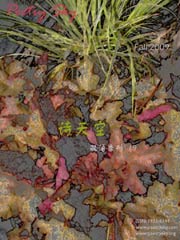 New to NewPages, Poetry Skyis the first bilingual poetry website in the world publishing both English and Chinese versions of contemporary Chinese, American and English poetry. It is a professional platform for the poetic exchange between Chinese, American and English poets. Its columns include Poetry Sky, Interviews, Critics’ Column and a forum to develop and exchange ideas or share views, etc. Poetry Sky publishes poems in both English and Chinese, while Interviews, Critics’ Column and Forum are available in either language.
New to NewPages, Poetry Skyis the first bilingual poetry website in the world publishing both English and Chinese versions of contemporary Chinese, American and English poetry. It is a professional platform for the poetic exchange between Chinese, American and English poets. Its columns include Poetry Sky, Interviews, Critics’ Column and a forum to develop and exchange ideas or share views, etc. Poetry Sky publishes poems in both English and Chinese, while Interviews, Critics’ Column and Forum are available in either language.
Poetry Sky is published every 15th in February, May, August and November. Submissions are accepted from August 16, 2009 to October 15, 2009 for the 20th issue — Winter 2009 issue. Poems published in Poetry Sky will possibly be included in their annual anthology.
In addition, Poetry Sky seeks contributing editors. As a contributing editor, you will have the opportunity to present your work and network with a growing community of poets (writers).
Spread the word!
New Lit on the Block :: Mannequin Envy
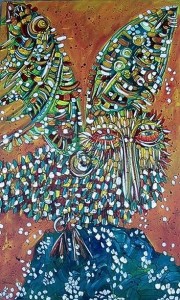 Summer 2009 is the second issue of Mannequin Envy, an online quarterly journal of poetic and visual arts staffed by Jennifer VanBuren: editor in chief, webmistress; Jai Britton: flash fiction editor; Patrick Carrington: poetry editor; and Alex Nodopaka: visual arts editor.
Summer 2009 is the second issue of Mannequin Envy, an online quarterly journal of poetic and visual arts staffed by Jennifer VanBuren: editor in chief, webmistress; Jai Britton: flash fiction editor; Patrick Carrington: poetry editor; and Alex Nodopaka: visual arts editor.
Available as a PDF, the Summer 2009 issue includes poetry and flash fiction by Abha Iyengar, Alison Eastley, Barton Smock, Bridget Gage-Dixon, Charles Reis, Cheryl Snell, Daniel Crocker, David Jordan, David Lawrence, Dennis Mahagin, Doug Ramspeck, Henry Louis Shifrin, John Sweet, Kathryn Jacobs, Lois P. Jones, Margaret Babbott, Mather Schneider, Richard Lighthouse, Roger Pfingston, Roy Lewis, Simon Perchik, Tim Kahl, and Tony Leuzzi. Julie Steinerand Don Shaeffer are the featured artists, and Julie Steiner is interviewed by Alex Nodopaka.
Mannequin Envy accepts submissions year round, but reads only in the month prior to publication (Sept 1 was their last reading deadline).
Spread the word!
Novel-T
What if your heroes are found in the bookstore instead of the ballpark? What if books are your game?
Novel-T offers an opportunity to express your support for the all-stars of literature. For those who feel a connection to certain writers or characters – be it Walt Whitman’s expansive exultations, Huck Finn’s mischievous morality, or Bartleby’s inscrutable insubordination – these super-soft, jersey-style tees are the way to “wear your read.”
The first “team” of nine players, representing a selection of writers and characters from the American literary canon, will take the field for the first time at the official Novel-T launch on 9.20.09 at Freebird Books in Brooklyn. New teams, featuring an increasing roster of domestic and foreign players, will join the Novel-T Word Series league shortly.
To help ensure that there will always be new names to add to the Novel-T line-up, Novel-T donates $1 of the purchase price of each shirt to 826NYC, a nonprofit organization dedicated to supporting students ages 6 to 18 with their creative and expository writing skills.
Spread the word!
Why the Anonymity?
A recent issue of interest has been the growing number of editors and publishers of online and print magazines keeping themselves “anonymous.”
Quite frankly, we’re finding this to be a more disturbing trend than not for a number of reasons.
One of the first is that blatant anonymity makes us suspect of the publication, of its validity and credibility.
When considering publications to list on NewPages, one of our minimal requirements is that there has to be an identifiable person who is willing to take responsibility for the finished product. Not being able to know the name of someone to contact if there is a problem, a question, or a concern makes the whole venture seem shady and fly-by-nightish. It’s one thing when no one identifies themselves on the web site, but when we write and ask for a contact, purely for our in-house information, and are denied this – we don’t feel this is a publication NewPages can recommend to our readers.
In the past, our readers have turned to us for help when they had concerns about such matters as how a contest was being run, when they could not get a reply on submissions, or even when their subscription stropped showing up and they could not contact the publisher. In these situations, we have contacted the publication and in most all cases, helped to resolve the situation. Not knowing who someone is does not help to create a working relationship, nor does it seem terribly collegial in the sense of literary community. In fact, it seems quite the opposite, which is exactly what it seems some publications mean to project.
If I had a dime for every time lit mags professed “we don’t want names to matter” and “we’re out to be different from the establishment”… Really, this is a highly cynical position to take against the many good, decent publications out there that indeed have had and currently have people working for them who are ethical, respectful, and concerned about the welfare of literature and publishing. This idea that keeping editors anonymous is the more ethical and just way to run a publication seems to call a lot of great work done by others corrupt.
Checking the backgrounds of those associated with the numerous new publications that crop up weekly is an effort that we make on behalf of our readers. Of course, as the saying goes, anyone can be a dog on the Internet, but we do look at names and attempt to verify these for any publications we list in our guides. We have always attempted to run NewPages as a site which recommends quality publications; we are not a clearinghouse of anything and everything out there – and our readers tell us they appreciate this about our site. If anything, anonymity in publications that claim high ethical standards give us an opposite opinion and raise many other questions: Are the editors publishing themselves? Are they publishing their friends? Honestly, how are we to know?
In terms of editorial credibility, it is helpful for writers as they are looking for places to submit their work to know the background of the people not only making the selections of the work, but who might also be editing their words. Certainly, there will be some people so eager for publication that it doesn’t matter to them, but I would like to know that my work will be given critical consideration – not turned away because it might have been too obscure for Mr. Smith’s eleventh grade class to understand, or, worse yet, published with errors I may have missed and Bill & Ted on their excellent publishing adventure really didn’t know enough to correct. I think most writers consider editors their “peers” in some way – at least in the sense that they will help a writer to grow through both acceptance and rejection and not allow their writing to make a fool of either writer or publication once it’s published.
At the professional level, the anonymous stance seems an immature one. I don’t know of any anonymous publication that has had any longevity. I can’t help but say it seems like a “youthful” attitude of self-righteousness and indignation – and one that won’t last long for any publication. Though I could be wrong – I’ll check back with some of you anonymous folks ten years from now – heck, five years from now, and we’ll see if you’re still around – or rather, if your publication is still around.
I have to ask about any writer submitting to an anonymous publication. Is this something to list on your publishing credentials? Is there any scrutiny of that? Again, I certainly do understand that for some people, this is not a concern, but I’m focusing on what we’re choosing to list here on NewPages and what our readers expect of what they’ll find here (aka our work).
I know at the higher professional levels, to list publications on our accomplishments, those publications have to have a verifiable editorial or peer review process. So, as much as I might admire the work I see on an anonymous publication, I can’t send in my work if I later want it considered for, oh, I don’t know, say a job I’m applying for, or promotion, or tenure. In fact, I recently reviewed an applicant’s resume and called into question two of the publications listed. I don’t think this would necessarily cost the applicant the job, but in some cases where this could make the difference, I think writers need to be careful about using such publications to bolster their credentials. Interestingly enough, in each of the anonymous publications I have seen so far, contributors include bios which list their publishing credentials. Slightly hypocritical, if names don’t matter – ?
Ultimately, it seems to me these spirited, young, anonymous publications are quickly finding their way around – mostly online – and if writers want to submit to them – for fun – they should by all means go ahead and do so. But as quickly as these efforts are sprouting up, they will also find their anonymous editors moving along to greener, more name-worthy publications. Ultimately, this is as any venture in life – user beware. I can’t think of too many situations in which I would engage in a working relationship with someone who insisted on remaining anonymous, though this might just be yet another of the web-future trends of publishing.
As for now – NewPages is not listing publications who insist on remaining anonymous. We have had long discussions about this, both in-house and with publications whose editors both have made themselves known to us and those who refuse to do so. We will continue to attempt to come to some understanding of this new phenomenon, but for now, we’ve had to make this a deciding factor in listings for our guides.
Spread the word!
Poet-Bot Cartoons
I’m not allowed to post one without paying for it, so a link will have to suffice: Poet-Bot Cartoons on Savage Chicken.
Spread the word!
Brevity Craft Essays
Check out Brevity’s Craft Essays from Issue 31, September 2009, “One of our strongest Craft quartets ever”:
Balancing Defense and Compromise: A Writer’s Perspective on Editors and the Editorial Process
by Jennifer Culkin
Back-Form.: Me ‘n’ Those Manuscripts
Edit: back-form. < Editor
by Stephen Corey
From Confession to Craft: Memoir as Its Own Reward
by Dinah Lenney
To Blog or Not to Blog? Using the Blogosphere to Shape Narrative Voice
by Towles Kintz
Spread the word!
Sidney: Booktown, BC
Literary mania is a year-round preoccupation in Sidney, a seaside town of 11,000 people, who live about 30 kilometres from British Columbia’s capital Victoria. Wherever you are, there’s a store on the next block. There’s one next door. There’s another a few doors down. And there’s one around the corner. There’s even one underground. There are 30 bookstores in all. Booktown? That’s an understatement. Read more about the experience from Steve Quinn.
Spread the word!
Barrelhouse Remembers Swayze
 To celebrate the life and sometimes brilliantly bizarre work of Patrick Swayze, Barrelhouse has assembled all the responses to The Swayze Question: “For the past five years, Barrelhouse has ended every interview with the same question: what is your favorite Patrick Swayze movie? We’ve asked The Swayze Question, quite literally, to anybody who would talk to us, everyone from Emmylou Harris to Ian MacKaye to Malcolm Gladwell to the Hold Steady.
To celebrate the life and sometimes brilliantly bizarre work of Patrick Swayze, Barrelhouse has assembled all the responses to The Swayze Question: “For the past five years, Barrelhouse has ended every interview with the same question: what is your favorite Patrick Swayze movie? We’ve asked The Swayze Question, quite literally, to anybody who would talk to us, everyone from Emmylou Harris to Ian MacKaye to Malcolm Gladwell to the Hold Steady.
“What’s your favorite Patrick Swayze movie? Is it a low-budget trucking action thriller? A big budget romantic escape with class warfare undertones? An indie drama about a disturbed kid who sees visions of a giant bunny rabbit? The one where he’s a doctor in India, who is kind of bathed in white light the entire time? The one where he’s a high school jock fighting the communists? See, that’s the thing about the Swayze Question: whatever your answer, it reveals a lot more about you than it does about Patrick Swayze.
“He’s been kind of our patron saint, so this seemed like the best possible memorial.” -Dave Housley
Spread the word!
Firth Earns Award
The award goes to the actor, Colin Firth, but the source material is from a novel by Christopher Isherwood and the subject is gay literature academic George Falconer. The film: A Single Man, directed, in his film debut, by fashion designer Tom Ford.
Spread the word!
Bad Review? You Decide
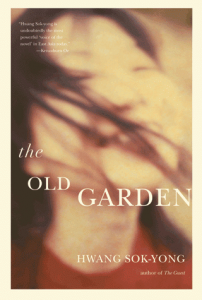 John Thorton writes: Seven Stories Press is serializing the first 62 pages of the English translation of Hwang Sok-yong’s The Old Garden, his 2000 novel and winner of the Danjae Award and Yi Literary Award in South Korea.
John Thorton writes: Seven Stories Press is serializing the first 62 pages of the English translation of Hwang Sok-yong’s The Old Garden, his 2000 novel and winner of the Danjae Award and Yi Literary Award in South Korea.
The novel’s central character is political prisoner Oh Hyun Woo, who is released after eighteen years to find that his world has completely changed and that the woman he loved has died. He returns to the house they shared briefly while both were involved in the radical resistance movement to South Korea’s military rule and there discovers her notebooks, through which he relives his life through her eyes.
The book received a strongly negative review by B.H. Myers in the New York Times Book Review, and the publisher hopes that by offering a substantial portion of the novel online for free, readers will be able to make up their own minds about this central work from the author Kenzaburo Oe called “undoubtedly the most powerful voice of the novel in East Asia.”
Spread the word!
ASEAN Literature Awards
The short story collection Ngoi Nha Xua Ben Suoi (The Old House by the Stream), by Tay ethnic writer Cao Duy Son has been nominated for the Southeast Asian Writers Award for Viet Nam this year. Here Son talks about the book as well as his writing career.
Spread the word!
College for $99 a Month
“The next generation of online education could be great for students — and catastrophic for universities.” Story by Kevin Carey on Washington Monthly.
Spread the word!
Old Lit Back on the Block :: Red Line Blues
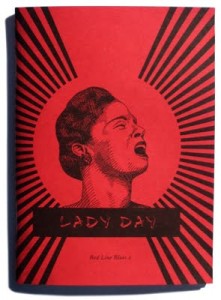 It’s nice to see a publication find their way back after one of those short breaks that often become permanent. Red Line Blues, a theme-based journal from Brooklyn, NY and Asheville, NC is back from their hiatus.
It’s nice to see a publication find their way back after one of those short breaks that often become permanent. Red Line Blues, a theme-based journal from Brooklyn, NY and Asheville, NC is back from their hiatus.
From the Red Line Blues Crew (Moriah Norris-Hale, Erich Nagler, and Benjamin Yanes): “We’ve been on hiatus for the past few months (ok, perhaps a year) renovating barns, traveling to Finland and back, and weathering the ole recesh’. We’re stoked to be back in the saddle and hope you’ll join us for issue #7.”
The upcoming theme for the issue is “Lean Times”: “Now that a full year’s limped by since Lehman went belly up, we’re marking the era with the theme ‘Lean Times.’ We’re casting the net for prose, poetry, photos, prints, drawings, and songs that illuminate our recent [in]securities, and tell the tales of staying afloat in the downturn. All submissions are due by Halloween, 2009 (Saturday, October 31st).”
See their website for further details.
Spread the word!
42opus – 2009
As a reviewer who regularly decries the sloppy and disorganized presentation standards of many emerging and established online literary magazines, it is refreshing to find one which states openly: “A good online magazine is accessible, intelligently designed, and carefully organized.” They go on to say: “Above all other technical considerations, the writing selected to appear in 42opus deserves a respectful presentation; we strive toward this goal through design that is contemporary, uncluttered, and professional.” Well, bravo, and I am happy to report that they succeed in this endeavor.
Spread the word!
Farrago’s Wainscot – July 2009
This is a difficult review to write for two reasons: 1) Much of the content found in this quarterly defies easy description and interpretation; 2) They are closing their operation as of October 1. Nonetheless, it is such a well organized and interesting website, a somewhat belated review is better than no review at all. Continue reading “Farrago’s Wainscot – July 2009”
Spread the word!
Fence – Spring/Summer 2009
Never on the fence, this journal is persistently – almost relentlessly – inventive, provocative, and unconventional. Not shocking. Not wildly unreadable. But certainly dogged in its desire to startle me out of complacency. “You find a little sick cognition,” begins “Gay Trade,” a poem by Sean Kilpatrick. “Lately my hand is an alligator,” opens James Gendron’s prose poem, “Number One Country.” And here is the beginning of “How to Make Something Funny of Something Serious into a Funny Joke and Then Back Again into Something Serious,” a short story by Colin Bassett: Continue reading “Fence – Spring/Summer 2009”
Spread the word!
Minnetonka Review – Summer 2009
“Not reading books is escapism,” insists editor in chief, Troy Ehlers. Reading is an “engagement,” a chance to “contemplate and process.” Minnetonka Review offers eight short stories, the work of two nonfiction writers, and poems from close to two dozen poets to help us think about how we relate to the world, including a section of Editor’s Prize winners with poetry by Rhonda C. Poynter and prose by Tim Keppel. Continue reading “Minnetonka Review – Summer 2009”
Spread the word!
PANK – 2009
Pank Magazine seems to delight in thoughts born of the abstract. The unassuming cover art sets the tone and establishes the journal’s aesthetic. The brush-painted invitation/confession “to anyone I have ever met:” precedes poems and short fiction that meditate on the serendipity that can be found in the life of a contemplative, literary person. Continue reading “PANK – 2009”
Spread the word!
Post Road – 2008
Post Road has everything. The sixteenth issue contains short stories, flash fiction, poetry, nonfiction, criticism, portions of a play, an interview, excerpts from journals, literary recommendations and full color artwork. Continue reading “Post Road – 2008”
Spread the word!
Salamander – Summer 2009
You’ll always find a few big stars in Salamander (Chase Twichell, Maura Stanton, Michael Collins). What’s more important, though, is that you’ll always find some stellar work. And this issue is no exception. I am thrilled to see two poems from Catherine Sasanov’s new collection, Had Slaves. I heard her read from this book last year prior to its publication and was quite taken with these spare (with the exception of their titles!), beautifully composed, and astoundingly moving poems about a family history of slave ownership. Continue reading “Salamander – Summer 2009”
Spread the word!
Tar River Poetry – Spring 2009
If you’re a poetry reader, you’ll recognize many names here (John Balaban, Nicholas Samaras, Sydney Lea, Gloria Vando) and be pleased to see their new work. And you’ll be pleased, too, with the quality of the work presented by poets whose names you may not necessarily recognize (Shannon Ward, Patrick Hicks, Caleb Beissert) and then most especially with the fine reviews by Phebe Davidson, Peter Makuck, and Richard Simpson. Continue reading “Tar River Poetry – Spring 2009”
Spread the word!
Tin House – Summer 2009
Tin House is celebrating its tenth anniversary, but it is the reader who receives the birthday present. The editors celebrate “art that provokes intense emotion,” presenting both psychologically potent stories and poems and interviews that invite the reader to reflect upon their own understanding of art. The top-notch graphic design, with full-bleed photograph pages before each story, makes the stories that much more inviting. Continue reading “Tin House – Summer 2009”
